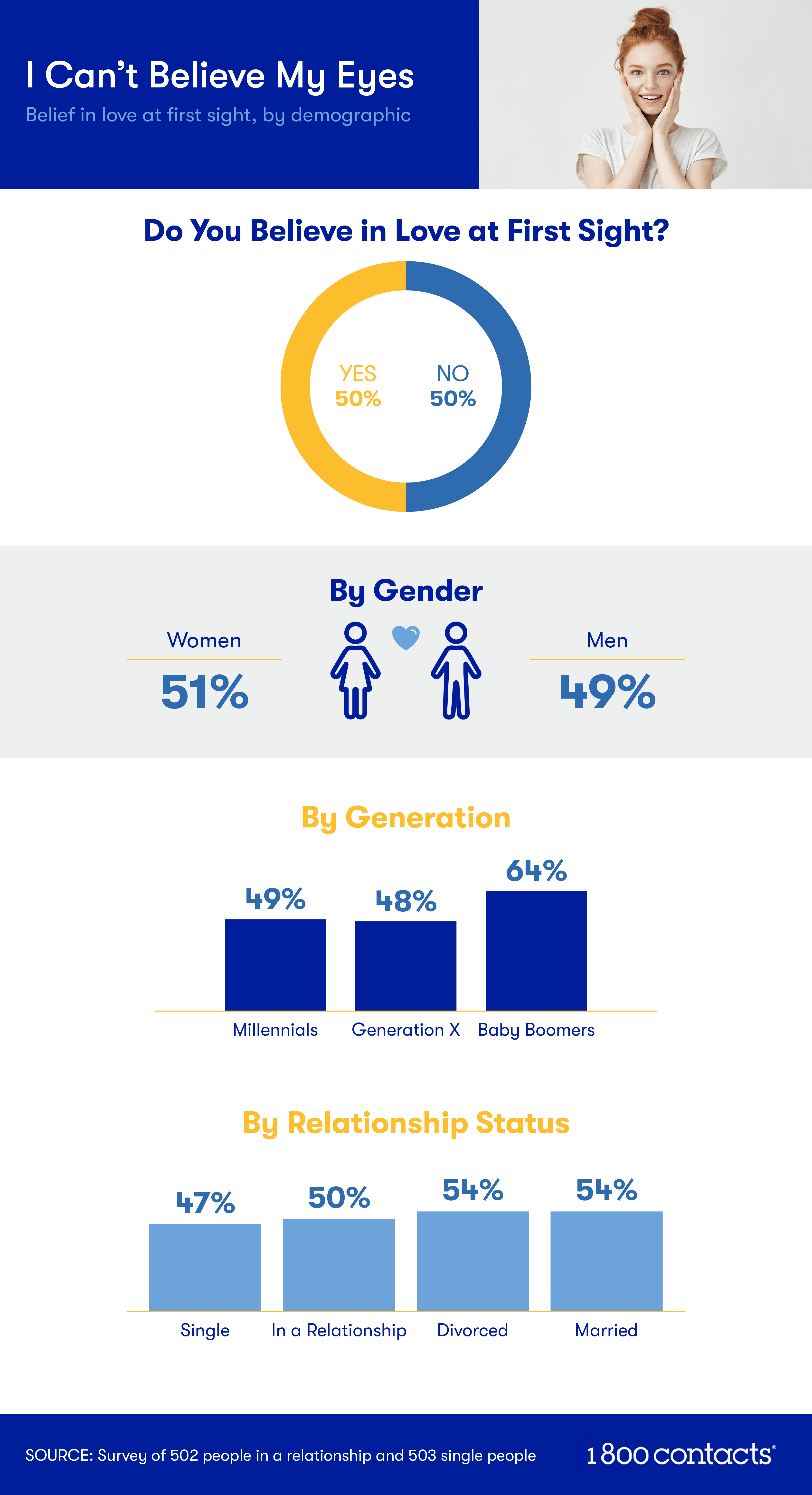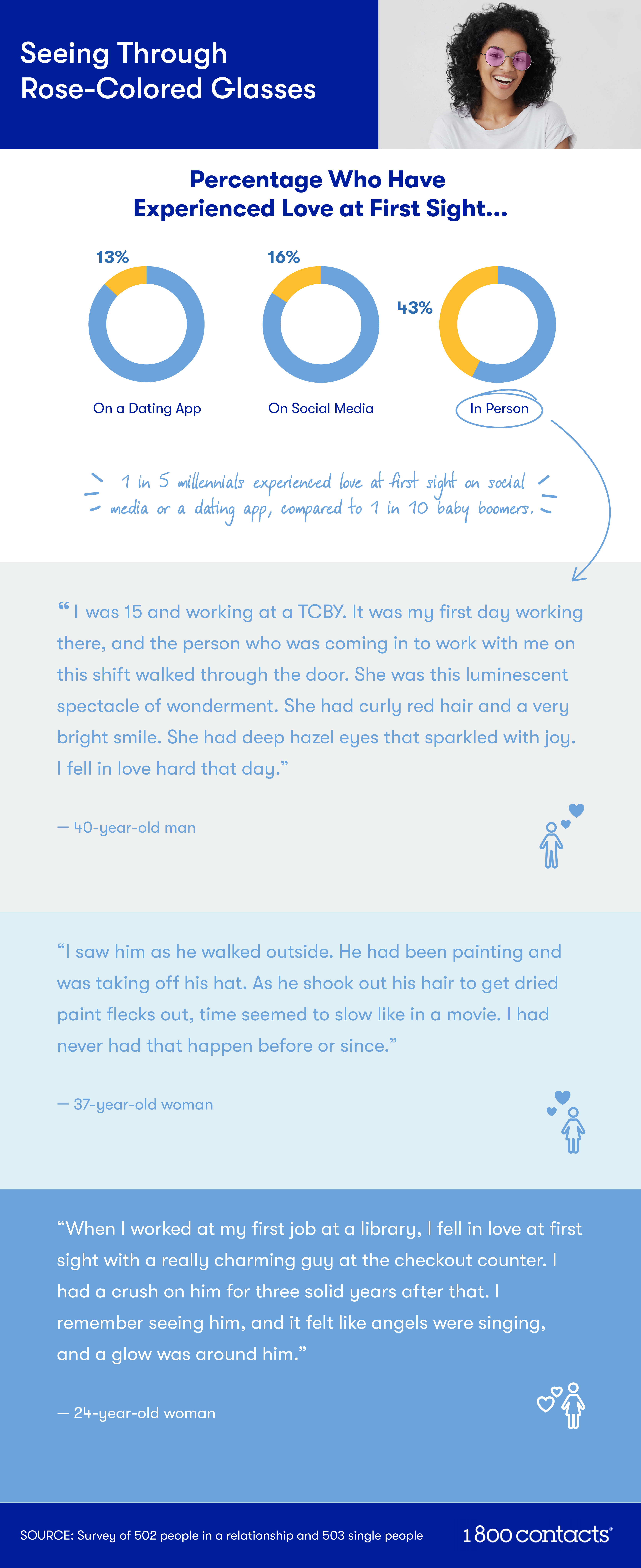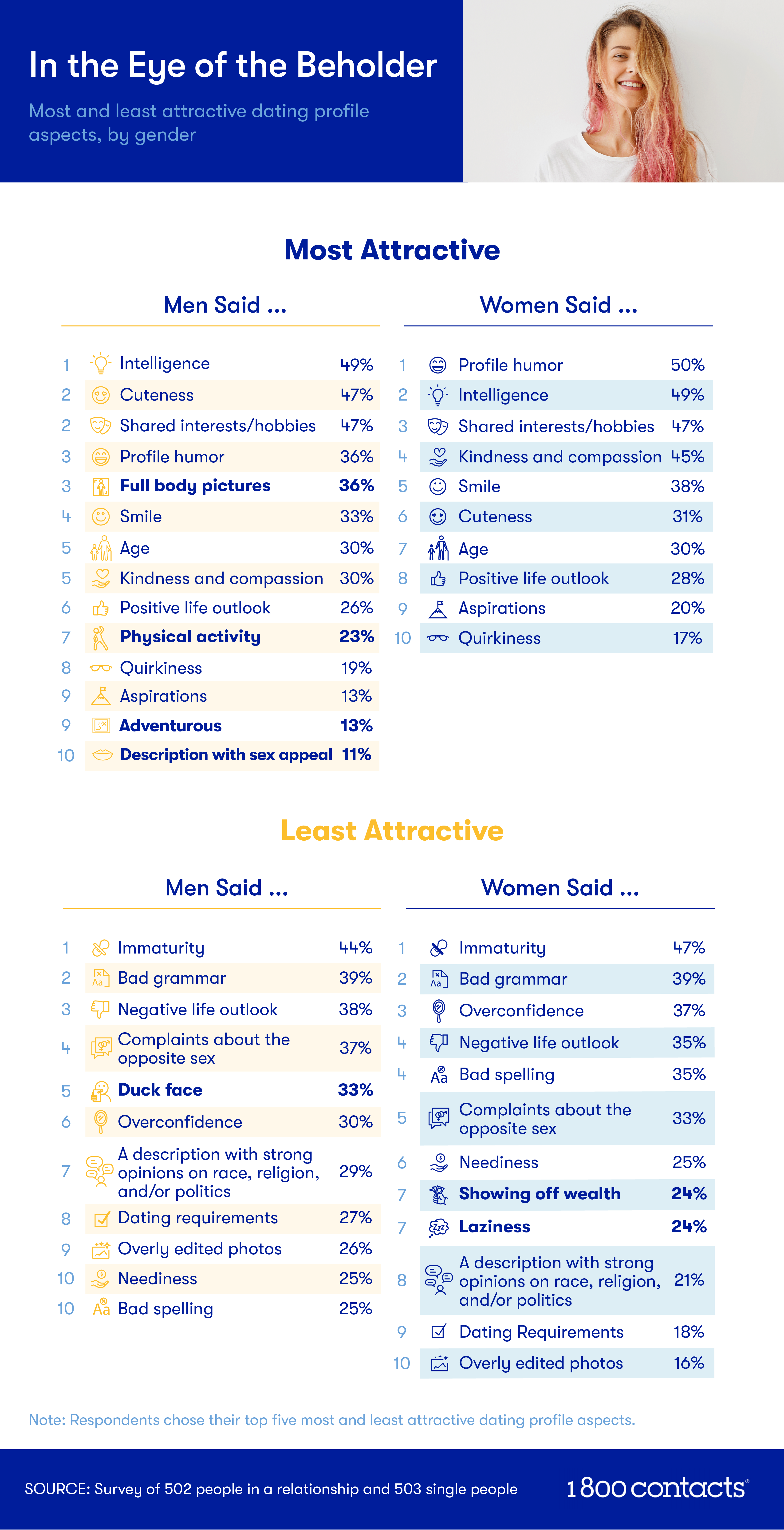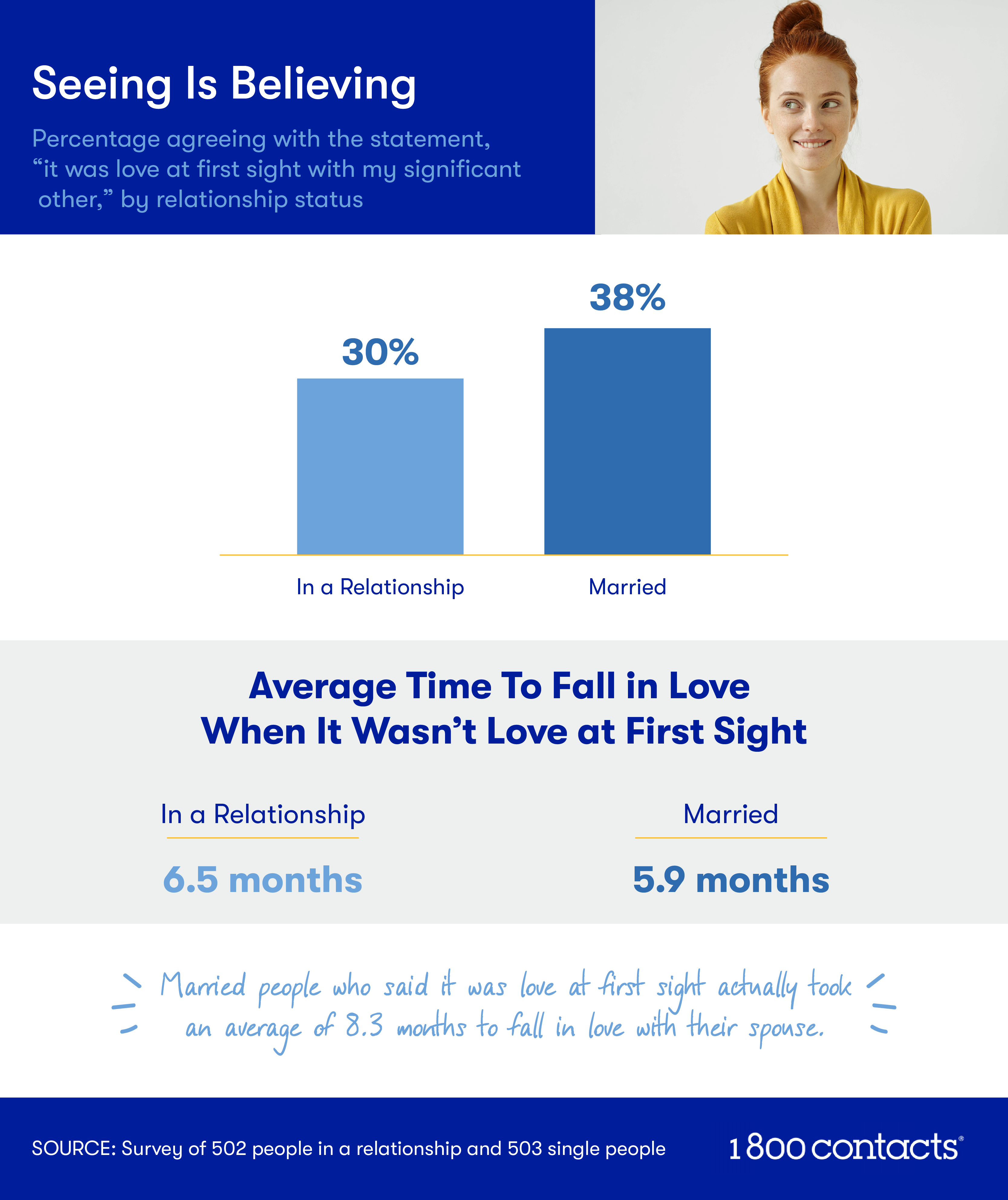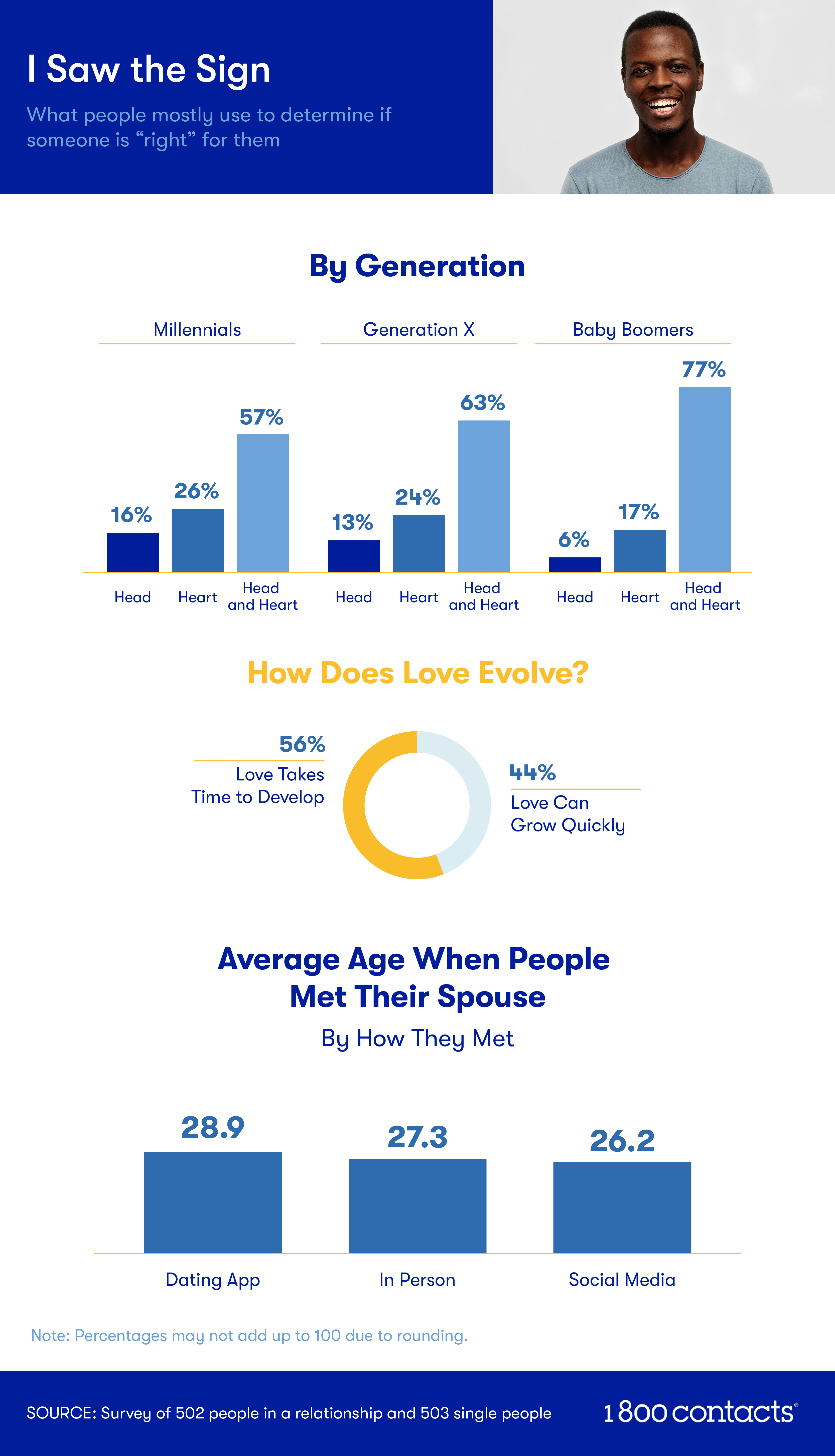Love at first sight
"Love at first sight" was coined by poet Christopher Marlowe when he wrote, “Who ever lov’d, that lov’d not at first sight?” But, how often does love at first sight happen? Does it even exist? Is it true love? Or a self-indulged illusion? Depending on whom you ask, there’s always a different answer or argument to the existence of love at first sight. Is it true love? How can you fall in love with someone at first glance? Some couples swear by it, claiming they knew instantly that they had found true love. Others argue it doesn’t exist, and what we’re feeling is lust, or we’re experiencing the “honeymoon phase” – not true love.
We surveyed over 1,000 people both in and out of relationships to learn exactly that.
Of the more than 1,000 people surveyed, exactly half believed in love at first sight, while the other half did not. Men and women were split nearly down the middle as well, with 49 percent and 51 percent believing in love at first sight, respectively.
The more serious the relationship was, the more likely respondents were to believe in love at first sight. Fifty-four percent of married and divorced participants had faith in the concept, compared to just 47 percent of single people and 50 percent of those in a relationship.
Generational gaps also divided the believers and nonbelievers: 64 percent of baby boomers believed in love at first sight, compared to 48 percent of Gen Xers and 49 percent of millennials. Perhaps portions of the younger generations will come to believe in love at first sight someday, depending on the people they encounter in the future.
The Science Behind Love at First Sight
Turns out, there's some science behind having chemistry with someone.
Some psychologists use the term “lust at first sight,” when describing what happens in the brain when we encounter what feels like “love at first sight.”
In an article by Psych Central, Dr. lee Philips is quoted, explaining that love at first sight, is actually our bodies experiencing the chemical/hormone release we encounter when we meet someone we find physically attractive. So, his argument is that we’re experiencing attraction, not true love. He explains that true love takes time and can only be “true” after knowing a person inside and out.
So, just when you think you’ve made it out of your hormone-riddled teen years, boom, “true love” comes along and makes you feel things. At least now, you’re not stuck in an acne-covered, accident-prone teenage body.
In scanning dating profiles, men were most attracted to intelligence (49 percent), cuteness (47 percent), and shared interests or hobbies (47 percent). Signs of a lack of intelligence were some of the most immediate turnoffs for men online. These included things like immaturity (44 percent disliked this) and bad grammar, which offended another 39 percent.
While women were attracted to relatively similar profiles (intelligence and shared interests or hobbies), their No. 1 desire was humor. Fifty percent of women hoped to find signs of comedy on the page of a potential partner. According to modern psychiatry, humor wields a beneficial power for the health of a relationship, so women’s search for this quality may be a very helpful instinct down the line.
Women, like men, also hated immaturity and bad grammar, but another 37 percent mentioned overconfidence. The hashtag #stayhumble has almost 4 million posts and counting, so remember to maintain a level of humility online and otherwise.
Thirty percent of people in a relationship said they believe their love began the first time they saw their partner, and 38 percent of married couples felt the same way about their current husband and wife. Even if love didn’t occur immediately, however, it often grew stronger over time for the remaining respondents.
If a couple didn’t fall in love at first sight, they said it took them an average of six and a half months to fall completely in love with each other. If they were married, this number dropped to just 5.9 months. Somewhat ironically, married people who said it was love at first sight actually took longer to fall completely in love with their current spouse, taking them an average of 8.3 months. Although they felt the love spark instantaneously, the truer, deeper love for their partner took roughly 2.4 months longer to develop.
Compared to previous generations, millennials are waiting longer to get married. Evidently, this might be because they’re considering the most mind-centric approach to the idea. Millennials were more likely than any other generation to use their head when deciding if someone was “right” for them (16 percent). Baby boomers, on the other hand, were the most likely to use both their head and heart when making this decision. Seventy-seven percent used their heart and head, while another 17 percent were able to decide from the heart. If the strength of these decisions is evaluated purely by divorce rates, it appears that millennials and Gen Xers tend to use their heads in love, leading to more successful marriages.
Love at First Sight, Done Responsibly
Some final words of advice from some people who know a thing or two about sight.
Even if you fall into the roughly 50 percent of people who don’t believe in love at first sight, a lot of people claim to have experienced it firsthand. Whether you fall completely in love in an instant or over many years, the odds of love’s occurrence are much higher if you can clearly see a potential romance. Stay present and appreciative of your current surroundings, whether these include a current partnership. Of course, ensure your vision is as clear and uninterrupted as possible, as you never know what you might miss otherwise.
The Glass-Half-Full Look at Love at First Sight
Kelly Gonslaves, a journalist and relationship coach for MBG Relationships, writes “There are plenty of happy couples in healthy relationships who claim to have fallen in love at first sight… Check-in with yourself to make sure you’re mentally and emotionally ready for a romantic relationship… some people have a once-in-a-lifetime experience of feeling an immediate loving connection to another person… Set boundaries as you explore your connection with this person.” And those words of wisdom are a great way to summarize how to take the glass-half-full approach when experiencing love at first sight. Enjoy the ride but be intentional and continue to build the foundation of your relationship.
Visit 1800contacts.com to effortlessly keep up with your vision needs today.
METHODOLOGY AND LIMITATIONS
For this study, we conducted an online survey of 1,005 respondents – 503 who were single, and 502 who were in a relationship – using Amazon’s Mechanical Turk. Forty-two percent were single; 25 percent were married; 22 percent were in a relationship; 8 percent were divorced and not remarried; 2 percent were engaged; and 1 percent were divorced and remarried. As for gender, 49 percent were male, and 51 percent were female.
The average age of our respondents was 35 with a standard deviation of 11. In terms of generational breakdowns, 4 percent were a part of Generation Z (born 1998 to 2017); 63 percent were millennials (born 1981 to 1997); 25 percent were a part of Generation X (born 1965 to 1980); and 8 percent were baby boomers (born 1946 to 1964).
Unique scales were used throughout this study, as respondents in relationships were asked to rate their relationship satisfaction, mutual trust, and mutual sexual attraction on a scale of 1 to 10. Those results were then averaged. Outliers were excluded from any calculations using quantitative values. An exhaustive list of dating apps and social media platforms was also included in the survey for respondents to choose from.
A limitation of the study is that we relied on self-reported data, which may come with the issues of selective memory, exaggeration, attribution, and telescoping. All claims are also based on means, and we did not perform any statistical testing on the data. These data are intended to be used for entertainment use only, and future research should approach this topic in a more academic and rigorous manner.
SOURCES
FAIR USE STATEMENT
So are you a believer in love at first sight? Feel free to use this study for noncommercial purposes to vouch for your opinions, so long as you are sure to link back to this page and its contributors.
Original published date: 1/24/2020
Updated: 1/19/2023






